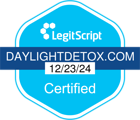Opioid Withdrawal Treatment
- Home
- Opioid Withdrawal Treatment
About Opioid Withdrawal
Opioid prescriptions are common, but when dependence takes hold, quitting can feel overwhelming. If you or a loved one has tried to stop, you know firsthand how intensely withdrawal symptoms can set in. These symptoms often feel unbearable, quickly driving people back to the drug just to feel “normal” again. This cycle reveals the true nature of opioid dependence: once someone relies on opioids, their body demands more to avoid feeling sick. When they try to stop or significantly cut back, withdrawal symptoms immediately follow.
Unlike dependence on some other substances, opioid withdrawal is not only uncomfortable but can also be dangerous. It goes beyond feeling off-balance; opioid withdrawal brings severe symptoms that make it nearly impossible to manage without support. Therefore, medical detox offers a crucial, structured approach to navigate withdrawal safely. With professional support and supervision, medical detox sets a solid foundation for recovery, helping you take those first steps toward healing with confidence and stability

Opioid Withdrawal Process at Daylight
Opioid dependence and withdrawal require professional medical intervention. With withdrawal symptoms that range in severity from mild to severe, medical detox should be undertaken in an accredited treatment center. Daylight Recovery Center makes the opioid withdrawal experience as safe and comfortable as possible. Highly personalized opioid detox programs and our caring team of experienced staff members make for the best possible experience.
Opioid Withdrawal Timeline
The length and severity of opioid withdrawals depend on a variety of factors, such as:
- The specific opioid used
- How long it takes leave the body
- Length of time dependent on the drug
- Frequency of use
- Dosage
Withdrawal symptoms are usually gone after about a week, but some psychological symptoms can persist. Depression, anxiety, and insomnia can last for months, and drug cravings can lead to relapse. Opioid withdrawal aftercare treatment is important for continued long-term success.
Early Stage
With many opioids, withdrawal symptoms can be felt just a few hours after the last dose. Initial symptoms might include frustration, anxiety, and cravings for the opioid drug.
Peak Stage
Within a day or two, depending on the specific opioid, symptoms become the most intense. A rapid heart beat, increased blood pressure, diarrhea, vomiting, insomnia, excessive sweating, flu-like symptoms, and strong drug cravings are common.
Late Stage
Within a few days, symptoms typically become less intense and, in many cases, are virtually gone within a week. Depression, anxiety, and drug cravings might persist for much longer.

The Best Opioid Treatment Programs
Opioid withdrawal requires medical supervision and care. The best opioid withdrawal treatment programs take a highly personalized approach and utilize proven methods that are backed by science. Outpatient care is appropriate in certain circumstances. For those who would benefit most from around-the-clock care, the best inpatient rehab facilities provide personalized opioid detox programs, medical care, therapy, integrative treatments, and other services. Daylight Recovery Center utilizes proven treatment methods in the most efficient and effective way possible.
Opioid Withdrawal Medications
Clonidine is sometimes used to treat opioid withdrawal at an inpatient treatment facility. Symptom-specific medications are given for anxiety, nausea, depression, diarrhea, and more. Mild symptoms can be treated with ibuprofen and Tylenol. The medication given depends on a number of factors, and that highlights the importance of medical detox under professional medical supervision. Withdrawal from opioids should not be attempted at home.
Dangers of Opioid Withdrawal
The more severe symptoms of opioid withdrawals can have serious and potentially life-threatening consequences. Depression and thoughts of suicide are of particular concern. More seemingly mild symptoms such as diarrhea and vomiting are dangerous because they lead to dehydration which, if untreated, is life-threatening.
Get Confidential Help 24/7
If you or a loved one are suffering with drug abuse or alcohol addiction, reach out to Flyland Recovery Network for addiction help.
Treatment Type
- Alcohol Withdrawal & Treatment
- Ambien Withdrawal & Treatment
- Barbiturates Withdrawal & Treatment
- Benzodiazepine Withdrawal & Treatment
- Cocaine Withdrawal & Treatment
- Fentanyl Withdrawal & Treatment
- Heroin Withdrawal & Treatment
- Inhalant Withdrawal & Treatment
- Methamphetamine Addiction
- Opioid Withdrawal & Treatment
Get confidential help 24/7.
If you or a loved one are suffering with drug abuse or alcohol addiction, reach out to Flyland Recovery Network for addiction help.

Frequently Asked Questions
How long do opioid withdrawal last?
The length and severity of opioid withdrawal depend on the particular opioid as well as other factors, such as the length of a person’s dependency on it, their frequency of use, and the dosage used. Withdrawal can last anywhere from 4 to 7 days, or more.
What do opioid withdrawals feel like?
With withdrawal symptoms that include stomach cramps, nausea, vomiting, diarrhea, seizures, tremors, anxiety, increased pain, thoughts of suicide, and more, opiate withdrawal is extremely unpleasant and dangerous. Daylight Recovery Center’s compassionate staff members make the opioid withdrawal experience as safe and comfortable as possible.
What are the symptoms of opioid withdrawal?
Opioid withdrawal symptoms can include the following:
- gastrointestinal distress
- excessive sweating
- dilated pupils
- hypertension
- tachycardia
- restlessness
- anxiety
- insomnia
- nausea
- vomiting
When does opioid withdrawal start?
Depending on the type of opioid used and the method by which it’s taken, withdrawal symptoms begin to appear within 12 hours after the last dose. Sometimes it can take up to one or two days for symptoms to show up.
What is withdrawal from opioids?
When someone is physiologically dependent on an opioid and they stop using it or suddenly and significantly reduce the dosage, they experience a range of unpleasant symptoms. The combined mental and physical effects can last up to 14 days or more, and some symptoms, such as anxiety, can persist for months. If you are addicted to opioids, receiving treatment at an opioid withdrawal treatment center can help you safely recover.
What helps opioid withdrawal?
Opioid withdrawal symptoms are most safely managed under medical detox at an opioid withdrawal treatment facility. Inpatient care is preferable in many cases as it allows for 24-hour professional care. Daylight Recovery Center can help you get through opioid withdrawal as safely and comfortably as possible. Our caring staff members can help you effectively recover from your dependence on, and addiction to, opioids.
What is inpatient opioid addiction treatment?
Inpatient opioid addiction and withdrawal treatment is care that is given in a 24-hour residential treatment facility. It is usually more intensive than outpatient care, which is non-residential. Daylight Recovery Center gives patients highly-personalized, 24/7 opioid withdrawal and addiction recovery care. Our experienced and compassionate staff members assist your needs in a setting that is highly optimized to help you overcome your addiction and move forward successfully.
What is outpatient opioid addiction treatment?
Patients who do not need intensive, 24-hour care can receive outpatient opioid addiction treatment. Outpatient programs allow you to go about your daily life and go to a treatment center periodically until the program is completed. However, if you have more than a mild opioid drug dependence, inpatient care is highly recommended. Daylight Recovery Center’s personalized opioid addiction and withdrawal treatment programs are designed to be as effective and efficient as possible with experienced staff on hand to attend to your needs 24/7.


